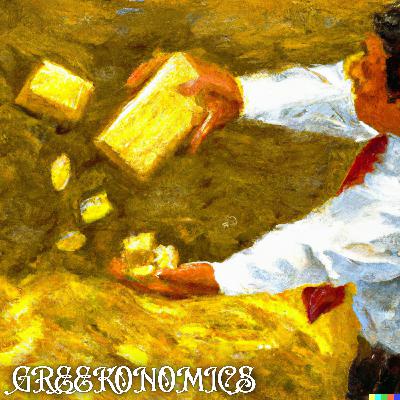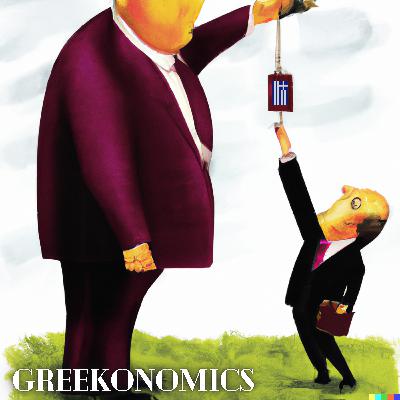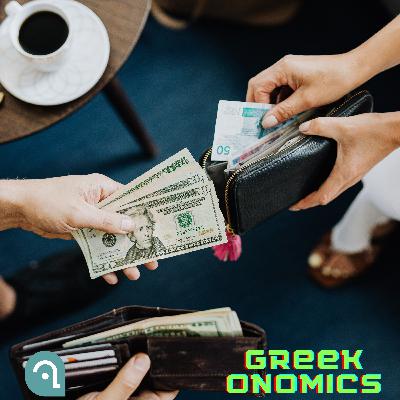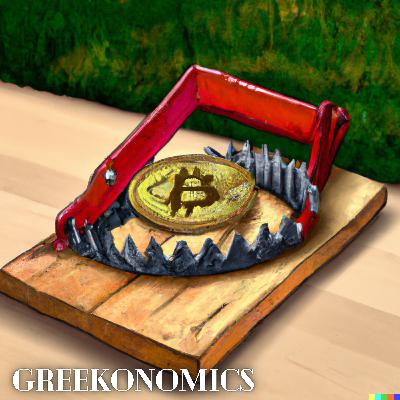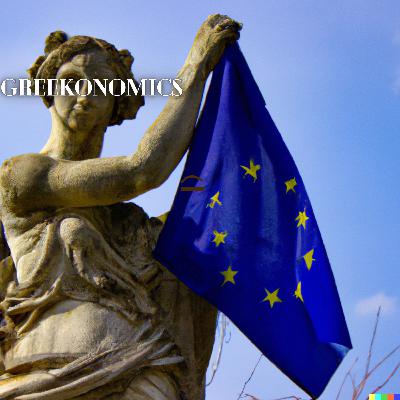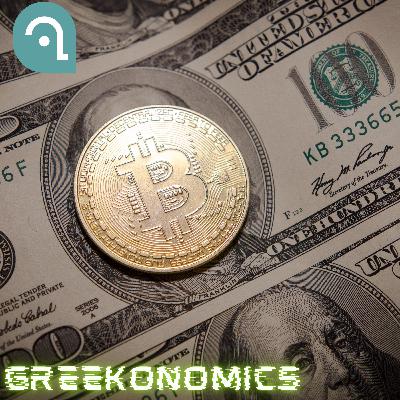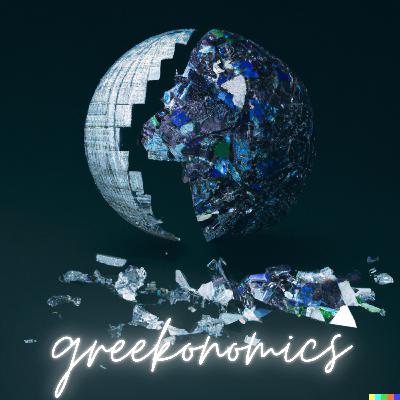Discover Greekonomics
Greekonomics

Greekonomics
Author: Upraze
Subscribed: 11Played: 24Subscribe
Share
© Upraze
Description
Greekonomics is a podcast hosted by Alkis, a 17-year-old that explores current and past economic issues. It has been created for the purpose of entertaining and educating. In a world characterized by globalization, it is important to be aware of our economic and social environment. We talk about topics such as the stock market, technology, and mainly current economic events with not only a focus on the Greek economy but also on the world as a whole. Our goal is to offer quality content to all teens and adults.
30 Episodes
Reverse
WAS DROPPING THE GOLD STANDARD A MISTAKE?
Gold is up. Inflation. People are worried about the value of paper money. Once upon a time a few decades ago, there was a thing called the gold standard: a promise. If you had a dollar, you could take it to the government any time you want, and trade it in for a fixed amount of gold. In today's episode, we will see why it was dropped, its pros, and cons.
Historical reference source: https://youtu.be/3_ex0sTsb_I
In this episode, we will be focusing on a Developing country: Mexico. More specifically, we will be analyzing its path to growth, its development, its strategies, its successes, and its barriers or failures. It is a nice complementary episode to our series about the Greek financial crisis as many macroeconomic theories and evaluations can be applied to every country, including Greece
In today's episode, we have invited Eric Mason. We will be talking about the current state of the labor market given the decline in GDP growth and asking other questions like his take on the optimal minimum wage. He is a practicing labor economist, who currently works as a chief economist in local government. His area of research focuses primarily on small business and macroeconomics trends and he has a special interest in historical economics and cliometrics.
In today's episode, we will be talking about the benefits and disadvantages of privatizations in the series about the greek financial crisis and the multiple key areas we are analyzing.
Source: Meghir, Costas, et al. Beyond Austerity: Reforming the Greek Economy (the MIT Press). The MIT Press, 2017.
In this episode, we have invited Didier Borel. Didier was a former bond trader, asset swap trader, and a broker. He likes financial markets but is more interested in how crypto as a technology is changing financial markets and society as a whole. He is interested in explaining and sharing his journey.
Kerry Lutz is a recovering attorney and serial entrepreneur. He became semi-retired at 40. He worked in the legal system for decades and has gained vital experience that can help be the difference between success and failure. He is also the owner of the financial survival network. A veteran podcaster with over 10 years experience and 7000+ episodes under his belt, he's written 4 books. The latest Viral Podcasting: A Proven Process to Earn a 6 Figure Income from your Show is an Amazon bestseller and regarded as the bible to monetizing a podcast. (With Contributions by noted Radio Consultant and Author Valerie Geller).
The Dollar has hit a 20-Year high and the Euro is nearly equivalent to the USD. A single euro bought $0.998 on the foreign exchange market at 12:45 GMT. The U.S. Dollar Index, which measures the value of American money against six major foreign currencies, has jumped almost 12% this year. We will be discussing the causes and the effects of this new economic phenomenon.
In today’s episode, we are going to talk about a topic that was strongly requested and it is whether Crypto is a Ponzi scheme? We will try to understand what truly is a Ponzi scheme and the characteristics of crypto that may or may not place it in this category.
Note this is not investment advice it is clearly for educational purposes nor is it based on any incentives to undermine the value of cryptocurrencies, this is based purely on your own discretion.
In this episode, we have invited Brad Fallon to talk to us about political polarization. Brad Fallon is the Chief of Staff to the Majority Leader of the Maryland House of Delegates. He has done work to completely revamp the Juvenile Services Education System for juveniles in detention centers, passed the Great Maryland Outdoors Act to invest over a hundred million dollars into our state park system, incubate tech companies based around public research, and more.
In this episode, we start to talk about Greece's participation in the EZ by utilizing a theoretical framework called the OCA to provide a first idea about whether the EZ entry was an economically "good" decision.
-
Source: Meghir, Costas, et al. Beyond Austerity: Reforming the Greek Economy (the MIT Press). The MIT Press, 2017.
In this episode, I will try to answer different questions on Reddit that people have asked regarding topics like inflation, the energy crisis, and economic growth.
Discussion with Tyler Uriah, an entrepreneur, podcaster, and traveler who shares his thoughts on entrepreneurship, having a mission at work, and the importance of small businesses among other topics we discuss.
In this episode, we talk about the Terra Luna crash, the causes, and the overall outlook for crypto with Navvye, a blockchain developer from India.
In this episode, we conclude what was discussed in the previous episode by mentioning the possible reforms and approaches that could be taken to tackle the multiple issues with the Greek educational system.
This is an interview from 395 productions from February 2022 in which I explain whether the current US debt is something to worry about. There is also a discussion about the conflict in Russia. The data and the discussion are from February yet the principles still apply today and help in understanding the situation. All copyrights belong to the original owner.
The first episode of this sub-series. Education. Since the Greek economy is neither a pioneer in technological progress nor at the other end of the spectrum is inexpensive in terms of labor costs, having a better educational system is crucial to increase competitiveness in a sustainable manner. What I am trying to say essentially is that it is not like Greece has got very cheap labor to compensate for the lower productivity as would be the case in a country like Colombia. The minimum wage in Colombia is about $1.61 an hour, and based on a workweek of 48 hours, the yearly wage becomes a bit above $4,000. It’s less than the average wage in the UK for one and a half months. This means that a better-educated labor force allows production to be competitive without resorting to a decrease in wages. And the quality of institutions like the justice system, media, and political representation is directly linked to the educational level of its citizens.
Covid-19 has restructured our society and the return to “normalcy” will not be easy. People were shaken by the pandemic, which forced them to reconsider what really matters, what their priorities are, and their overall wellbeing. This led to a shift towards more flexible schedules and a better home-work blend that fully utilized the benefits of online platforms. Newly leveraged aspects of technology will dramatically change workplace culture and how we approach jobs and careers… perhaps forever
The minimum wage law is a constantly debated issue amongst economists and politicians, and there have been multiple pieces of research on the topic for and against this measure. In light of the work of US-based economists David Card and Alan Krueger, who won the Nobel Prize in economics last year, let's analyze the basic theory and update it based on this recent work. We will also explore the current socioeconomic environment and the effects such a policy could have on us.
In today's episode we will be exploring the recent SVB collapse, its cause, and the future implications.
In today's episode, we will discuss the new era that is emerging in the post-neoliberal world and its economic implications.


